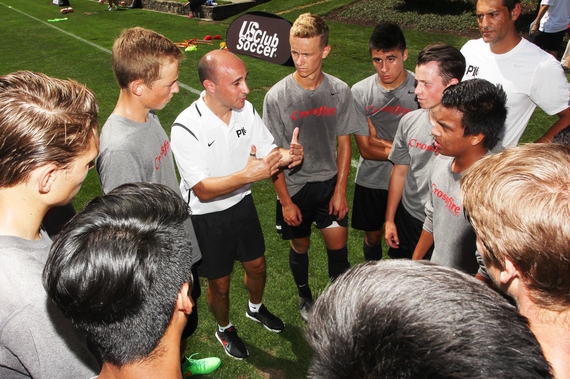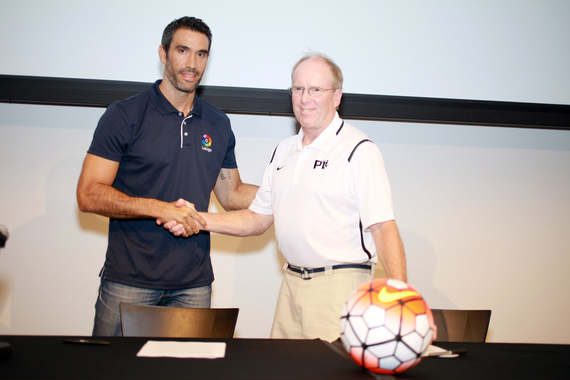Will soccer become the most popular sport in the United States?
To Baby Boomers, that question is preposterous. "No way," many would answer.
To Millennials, the answer to the question is not "If," but, "When?"
Soccer's popularity is booming in the United States. One must look no further than the viewership numbers for the 2015 Women's World Cup Final. The American women's victory over Team Japan was viewed by more Americans than Game 6 of this year's NBA Finals and the final game of the 2014 World Series.
What's driving the rising interest in soccer? Can it merely be attributed to the Women's World Cup Final falling during the summer lull of sports television scheduling? Was the high viewership rate simply the result of the game being played during American primetime television?
Asserting that high soccer viewership rates are resultant of television or sports scheduling spits in the face of the significant strides the sport has made in the United States over the last two decades. Guiding those significant strides is soccer's grassroots effort.
Today, 6.6 million youth in America play soccer. Yet, according to US Club Soccer CEO Kevin Payne, 70 to 75-percent of players leave the game by age 13. With that concern in mind, US Soccer has launched an innovative new youth soccer development program, Players First, in conjunction with Nike and La Liga.
"Over the course of many meetings with people involved in youth soccer around the country, it became apparent that there was an issue with the way youth soccer was operated. Parents guide the ship in youth soccer, but they didn't have any way to measure the value of their kids' soccer experience. Instead, they tended to rely on results. Parents put a lot of pressure on coaches and clubs to emphasize winning. Instead of focusing on developing each player to their highest level, we've been focused on winning youth soccer matches. That's possibly the single worst thing you can do to create a constructive development model," Payne said.
Realizing that youth soccer's model needed to change if the sport wanted to retain players, Payne and US Club Soccer set out to change the model. The result was Players First, a holistic club soccer experience for parents and players emphasizing the development of individuals to their full potential, and helping parents make better choices about where their children should play.
In terms of developing players, Players First aims to "develop an environment in club soccer which encourages the development of each player to whatever level they choose to develop," according to Payne. Payne believes that this approach could have benefits down the road in terms of the United States' success in global match play.
"If you look at our challenges over the years, we've produced a number of players who are very good athletically, but we tend to not produce players at or near world class levels of technical development. That's where we fall down when we play top teams in the world," Payne said.
Along with restructuring the method under which American youth players are developed, Players First seeks to give parents a better sense of the quality of training their children will receive.
"We want to create a vernacular for parents to understand the philosophy and level of commitment their child's club is providing. Think of it like a consumer report or Good Housekeeping seal of approval," he noted.
Part of what will play into that vernacular is the coaching training and philosophy that Players First coaches will be able to access. "The countries of the world that have adopted a very systematic approach and have had success with that--countries like France, Germany and Spain--understand that if they want to produce great players, they have to have great coaches. In order to develop great coaches, they must create a comprehensive system for instructing coaches," Payne explained.
One way Players First provides comprehensive instruction for its coaches is through its partnership with La Liga. "We are developing a comprehensive relationship with La Liga, which will include periodic coaching workshops conducted by La Liga's player development experts. These will be conducted on a regional basis and will introduce ambitious coaches in the U.S. to the methodologies clubs in La Liga use to develop talent. This is about providing additional educational opportunities for the best coaches in our organization to learn more about a system which is arguably amongst the top-two or three in the world in producing players," Payne said.
Payne and U.S. Club Soccer have set out on a significant mission to change the culture of youth soccer in America with the goal of retaining more players and developing higher caliber athletes. Payne, though, knows the task won't be easy.
"We're on a mission to change the sport. In order to achieve our mission to change the sport, we need a vision, courage, enthusiasm, resilience and a plan. The reason we should be attempting to embrace a Players First philosophy is not because it will be easy, but because it will be hard," Payne said.


